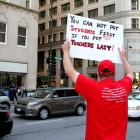

An 11-year-old denied making a threat and was allowed to return to school. Tennessee police arrested him anyway.
|
In late September, Torri was driving down the highway with her 11-year-old son Junior in the back seat when her phone started ringing.
It was the Hamilton County Sheriff’s deputy who worked at Junior’s middle school in Chattanooga, Tennessee. Deputy Arthur Richardson asked Torri where she was. She told him she was on the way to a family birthday dinner at LongHorn Steakhouse.
“He said, ‘Is Junior with you?’” Torri recalled.
Earlier that day, Junior had been accused by other students of making a threat against the school. When Torri had come to pick him up, she’d spoken with Richardson and with administrators, who’d told her he was allowed to return to class the next day. The principal had said she would carry out an investigation then. ProPublica and WPLN are using a nickname for Junior and not including Torri’s last name at the family’s request, to prevent him from being identifiable.
When Richardson called her in the car, Torri immediately felt uneasy. He didn’t say much before hanging up, and she thought about turning around to go home. But she kept driving. When they walked into the restaurant, Torri watched as Junior happily greeted his family.
Soon her phone rang again. It was the deputy. He said he was outside in the strip mall’s parking lot and needed to talk to Junior. Torri called Junior’s stepdad, Kevin Boyer, for extra support, putting him on speaker as she went outside to talk to Richardson. She left Junior with the family, wanting to protect her son for as long as she could ...

Pennsylvania High Court to Make Make Key Call on Juvenile Life Sentences
|
The Pennsylvania Supreme Court is hearing oral arguments today that may lead to a chance at parole for more than 400 inmates convicted of murder as minors. The Court is deciding if a June 2012 U.S. Supreme Court decision is retroactive, and if so, what sentence should be given to two convicts in today’s cases. The federal court, in Miller v. Alabama, said that minors convicted of murder have a right to present mitigating factors — such as the immaturity of youth — to sentencing judges. That invalidates one-size-fits-all mandatory life without parole sentences listed in federal and 28 states’ statutes. “It’s about retroactivity and also resentencing,” said Marsha Levick, deputy director of the Juvenile Law Center in Pennsylvania, who is arguing for retroactivity before the court.

Sites, Sounds from the Chicago Teachers’ Strike
|
By Audrey Cheng and Jennifer Starrs
Emotions and rhertoric have been running high as CTU teachers and paraprofessionals formed picket lines, beginning early Monday and continuing Wednesday with no quick end in sight for the first schools strike since 1987. Teachers are pushing for a contract, better working conditions and more social workers in schools, amomg other issues – while administration officials are pressing for big curricular and testing changes, including a greater emphasis on programs like charter schools.
Audrey Cheng and Jennifer Starrs are reporters for The Chicago Bureau.

Widespread Worry in Chicago About Safety of Children as Strike Continues
|
Following another Chicago summer during which many youth were slain in gang or drug disputes, there was concern on both sides of the Chicago teachers’ strike this week about the safety of the children whose school doors have been shut during negotiations over a new contract. There was little patience and much anger leading up to, and following, the breakdown of talks late Sunday, which picked up again with the new week but so far have failed to stem the first strike here since 1987. That’s a quarter century of relative labor peace in a city where walkouts and the delay of the school year were regular. While remembering those union battles might stretch the memory of many Chicagoans, there's little need to stretch the imagination about what might happen if minors are left unwatched or unsupervised as parents return to work. Consider: Through the first week of September, homicides in Chicago were up nearly 30 percent over last year to 366, and overall shooting incidents were up 10 percent.

Attacking a Good Program in South Georgia
|
I was appalled when I read a recent article in the Macon (Ga.) Telegraph titled "Report blasts Bibb County School System’s Handling of Student Discipline." The story was in response to a report published by Safe Havens International that, in part, criticizes the recent agreement between the juvenile court, police and the local school system to reduce the referral of certain misdemeanor offenses to the juvenile court and focus more on meaningful intervention that is long lasting according to the research. The Safe Havens report recommends that the school system withdraw from the agreement. What’s playing out in south Georgia now has no doubt happened in many communities across the country where a group -- at best acting out of ignorance or at worse out of self-interest -- tries to wreck good public policy that is designed to help kids and society. But let’s take a closer look at who is behind this report.

An Inside Look at Reporting Abuse
|
Emergency vehicles appeared again this week at the door of a family we know. It’s such a common occurrence that the family greets the firemen by first names. After hearing about the latest event, I was sorely tempted to call the state of Georgia’s office of child protective services to check out what actually goes on behind closed doors. Maybe they’ll find concerns, but maybe not. There are a couple of reasons why I hesitate. First, I was a foster parent for more than two years for some girls that had been involved in an abuse/neglect case.

California Legislature Can Do More to Help Kids
|
California has always been ahead of the curve. Fresh on the heels of the Supreme Court ruling in Miller v. Alabama, which prohibits mandatory juvenile life without parole sentences (JLWOP), the California Supreme Court announced that a 110-year sentence for a non-homicide crime was the equivalent of juvenile life without parole and thus unconstitutional in the case of People v. Caballero. Caballero, who was 16 at the time his crimes occurred, would have had to serve 110 years in prison before even having the possibility of going before a parole board. The California Court’s opinion, released August 16th 2012, relies heavily on the reasoning put forth by the United States Supreme Court two years earlier in Graham v. Florida, where it flatly prohibited a JLWOP sentence for a non-homicide crime. The Caballero Court noted that developments in psychology show fundamental differences between juvenile and adult minds, that a life without parole sentence serves a very limited penological purpose for juveniles, and that children have the greatest possibility of rehabilitation.



